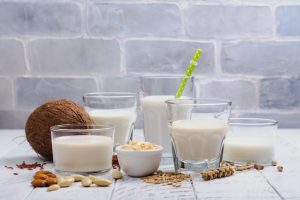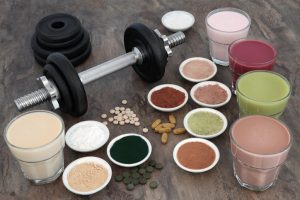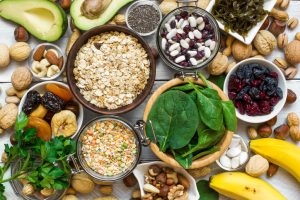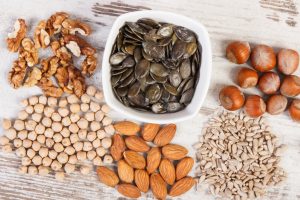In Part 1 of this post, we covered vegan diets for fitness on the macronutrient level. In this post, we delve a bit deeper and look at micronutrients. Vegans can most definitely hit their fitness goals, although getting clued up on possible vitamin and mineral deficiencies, and how to fix them if necessary, will ensure you maximise your fitness while sticking to a vegan diet.
Vegan Diets for Fitness – Micronutrients
If you’ve read part 1, you’ll now have a firm idea of how to make sure you’re getting the right macronutrient balance. But micronutrients are essential for fitness too. There’s no reason why a vegan diet cannot be perfectly healthy. And it’s important to note that it isn’t just vegans who run a risk of nutrient deficiencies. Any diet can lack in one or more micronutrients. But even the healthiest of vegans are prone to deficiencies. This is due to the bioavailability of some micronutrients in plants. Because of this, these micronutrients need extra attention.

Vitamin B12
Vitamin B12 is an essential vitamin, meaning we need to get it from food. It’s responsible for providing the body with energy and supports nerve cell function. This helps power you through your workout and supports your nervous system. However, because it is naturally found in animal products, vegans are often deficient. Studies show that a shocking 52% of vegans have a B12 deficiency (Gilsing et al., 2010).
One of the most common signs of B12 deficiency is fatigue and lack of energy (Berkheiser, 2018). As you can imagine, this is a huge drawback when it comes to workout motivation. This is why sports nutritionist Emma McCrudden‘s plant-based athletes take a B12 supplement. She sees this an essential part of vegan diets for fitness.
Calcium
For adults, the recommended intake for calcium is 700mg per day (BDA, 2017). This is an essential mineral in the context of vegan diets for fitness. During exercise, we lose calcium through perspiration. As well as maintaining healthy bones, it’s important for muscle contraction. So, without sufficient amounts, you might experience muscle cramps (University of Michigan, n.d.). Because it is obtained mainly through dairy products, a vegan’s intake could well be too low.

However, many vegan milk substitutes contain added calcium. Calcium is also found within many whole foods such as figs, chia seeds, almonds, and kale. This is an example of how food quality is key. Ensure your daily intake comes mostly from whole foods, and that your milk substitute contains added calcium.
Creatine
When it comes to vegan diets for fitness, creatine supplementation is very popular. Creatine is widely proven to improve exercise performance (Kreider et al., 2017). However, vegans are unable to get creatine from their diet. Because it exists solely in animal products, supplementation of creatine is the only way.

Luckily, creatine monohydrate is relatively cheap and very easy to consume. Furthermore, sports nutritionist Danny Lennon highlights that vegans might get even more benefit from a creatine supplement than an omnivore would. He says that because vegans will have lower muscle creatine stores, they will get even more of a performance boost when using the supplement.
Iron
Iron is a key nutrient when it comes to vegan nutrition. Hemoglobin, containing iron, is responsible for supplying your cells with oxygen. Iron deficiency can result in declining performance during exercise and slow recovery. It can also cause headaches during exercise, shortness of breath and increased risk of injury (Blatner, n.d.).

It’s true that iron can be easily sourced from plants. Many legumes, grains, nuts, and vegetables contain this important mineral. However, vegans are still often deficient in iron. This is due to the issue of bioavailability. There are two types of iron, namely heme, and non-heme iron. Heme iron, found in animal products, is more readily absorbed by the body. The bioavailability of iron in mixed diets is around 18%. In vegan diets, this can be as low as 5% (Hurrel & Egli, 2010).
Polyphenols and Phytates
Nutritionist Lennon points out a further issue with iron. He explains that vegan diets are often high in polyphenols and phytates. Coffee and tea contain polyphenols, while grains and legumes are high in phytates. These block the absorption of iron.
Vegans can address this to an extent by eating more iron. The recommended intake of iron is 8.7mg for men, and 14.8mg for women (NHS, 2017). However, Lennon advises that vegans eat around 1.8 times more than this. Alongside this, he suggests supplementing with Vitamin C, which can help the body absorb iron.
Zinc
As well as iron, phytates affect the rate of absorption of zinc. This mineral supports the creation of new synapses and nerve cells. It is also involved with the metabolism. Some studies also show that zinc has a role in testosterone production (Wilborn et al., 2004). These are all reasons why zinc is an important part of good vegan diets for fitness.

Researchers suggest that vegans consume up to 50% more zinc than omnivores (VeganHealth.org, n.d.). It’s possible to avoid potential zinc deficiency simply by consuming more zinc-rich foods. However, many of these foods also contain phytates. In vegan diets for fitness, good sources of zinc without phytates include nuts, seeds, and tofu.
Summary
There’s no reason why vegan diets for fitness cannot be effective. However, vegans run a higher risk of micronutrient deficiencies, and this could affect many fitness goals. The good news is that it’s easy to make adjustments to your diet and avoid deficiencies. A mix of eating more of certain whole foods, plus supplementation, will ensure your vegan diet helps you hit your goals.

If you haven’t done so already, check out part 1 of this post, covering macronutrients. Need a workout plan to accompany your diet? Read up on how to choose the right workout plan.
